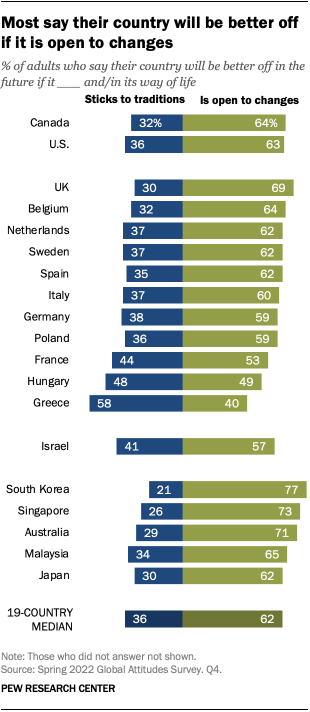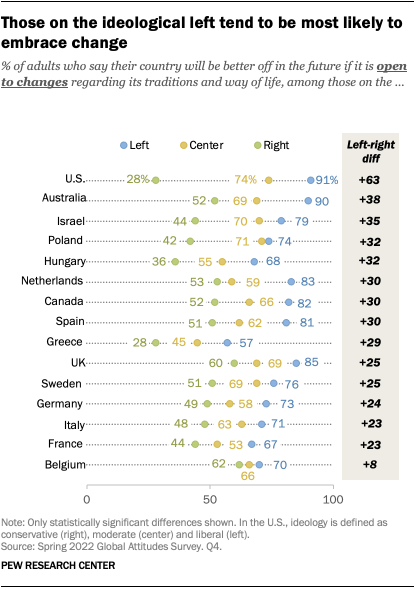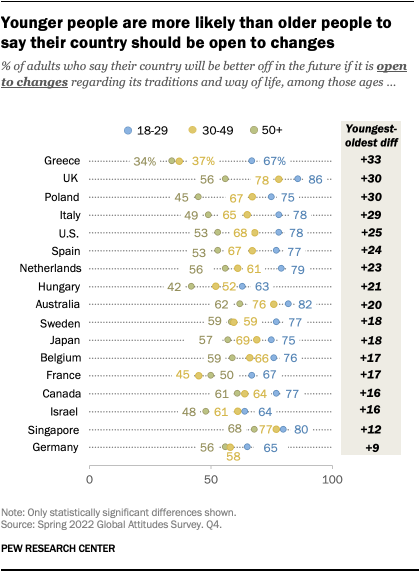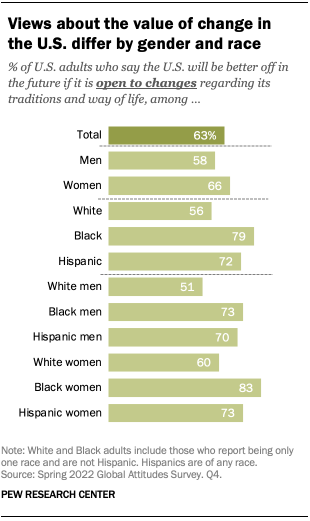
In a world of rapid technological advances, economic upheaval and evolving values, many of today’s most heated political debates involve the question of how countries react to change. To explore this issue, Pew Research Center asked people in 19 advanced economies whether they believe their country will be better off in the future if it sticks with its traditions and way of life or if it is open to changing them.
Pew Research Center conducted this analysis to explore attitudes toward tradition and change in 19 advanced economies in North America, Europe, Israel and the Asia-Pacific region. Attitudes are examined through long-term trend data and demographic analysis.
For non-U.S. data, this analysis draws on nationally representative surveys of a total of 20,944 adults from Feb. 14 to June 3, 2022. All surveys were conducted over the phone with adults in Canada, Belgium, France, Germany, Greece, Italy, the Netherlands, Spain, Sweden, the United Kingdom, Japan, Malaysia, Singapore and South Korea. Surveys were conducted face to face in Hungary, Poland and Israel. The survey in Australia was conducted online. For more about the online survey, read the Australia methodology. For more information on how we classify European populist parties, read the appendix.
In the United States, we surveyed 3,581 adults from March 21 to 27, 2022. Everyone who took part in this survey is a member of the Center’s American Trends Panel (ATP), an online survey panel that is recruited through national, random sampling of residential addresses. This way nearly all U.S. adults have a chance of selection. The survey is weighted to be represented of the U.S. adult population by gender, race, ethnicity, partisan affiliation, education and other categories.
Here is the question used for this analysis, along with responses. Visit our international methodology database for more information about the survey methods outside the U.S. For respondents in the U.S., read more about the ATP’s methodology.

Mostly, people embrace change. Across the nations surveyed, a median of 62% of adults – including 63% in the United States – say their country will be better off if it is open to changes. Europeans also largely say their countries will be better off if open to changes, although Hungarians are split on this question and most Greeks think their country will be better off adhering to traditions.
People in the Asia-Pacific region are especially likely to see value in being open to changes, with seven-in-ten or more holding this view in South Korea, Singapore and Australia.
While majorities in most countries favor being open to changes, there are important demographic and ideological differences on this question.
In most nations surveyed, those who place themselves on the ideological left are significantly more likely than those on the right to believe their country will be better off if it is open to changes.

In the U.S., this ideological gap is far wider than in any other nation surveyed: 91% of self-described liberals favor openness to changes, compared with just 28% of conservatives. Americans in the center of the ideological spectrum align more with liberals than with conservatives on this question.
Supporters of right-wing populist parties in Europe consistently stand out in their lack of enthusiasm for change. For example, among those with a positive opinion of Poland’s Law and Justice party (PiS), just 39% say their country will be better off if it’s open to changes. Among Poles with a negative view of PiS, by contrast, 74% say this.

Age is another major factor in nearly every country surveyed. Younger people are much more likely than older people to say their country will be better off if it is open to changes in its traditions and way of life. These differences are most evident in Greece, where 67% of those ages 18 to 29 say their country should be open to changes – a view shared by only 34% of those 50 and older.
Education also shapes attitudes toward change. Those with a college degree or more education are much more likely than those with less education to say their country will be better off if it is open to change. For instance, in Singapore, around eight-in-ten of those with at least a college degree express this opinion, while only 62% of those with less education say the same.
Views on this question are also related to religion. Religiously unaffiliated people are often more likely than their religious counterparts to say openness to changes will make their country better off in the future. Eight-in-ten religiously unaffiliated Americans hold this view, compared with only 55% of those who identify with a religion. White evangelicals in the U.S. are particularly unlikely to take this view: Only one-in-three say their country will be better off if it is open to changes.
Men are less likely than women to embrace change in Canada, France, Spain, Sweden, Australia and the U.S.

Americans’ views also diverge along racial and ethnic lines. Black and Hispanic adults are more likely than White adults to believe the country will be better off in the future if it is open to changes. White men, in particular, are divided: Just 51% say the U.S. will be better off if it is open to changes, while 48% favor sticking to traditions.
Note: Here is the question used for this analysis, along with responses and the full dataset. Visit our international methodology database for more information about the survey methods outside the U.S. For respondents in the U.S., read more about the ATP’s methodology.




